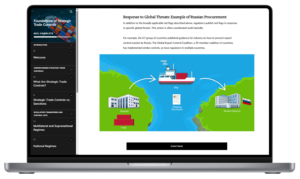Sanctions and Export Controls Update
Monthly Roundup – August 2025
📅 September 3, 2025
📅 September 3, 2025
Welcome to this month’s Sanctions and Export Controls Update, highlighting IFI’s take on key developments from August 2025.
The United States continued to take action against Mexican drug cartels and Iran’s oil exports and evasion networks, and President Trump said he is ready to impose “very serious” sanctions against Russia if President Putin fails to agree to a ceasefire in the war in Ukraine. Meanwhile, the EU and UK imposed additional sanctions on Russia and Belarus, and the EU is reportedly considering secondary sanctions against Russia as part of its 19th package of restrictions. France, Germany, and the UK began the process to “snapback” United Nations sanctions on Iran over its nuclear program, and the UK sanctioned trading networks enabling Iran’s destabilizing activity.
The Treasury Department acted against three of the six Mexican drug cartels designated earlier this year as Foreign Terrorist Organizations (FTOs) and issued an advisory and an assessment about Chinese money laundering networks (CMLNs) responsible for laundering proceeds for Mexican drug cartels. It also sanctioned notorious Costa Rican narcotraffickers and extended the deadline for U.S. financial institutions (FIs) to stop processing transfers with three Mexican FIs associated with laundering money for sanctioned drug cartels.
Treasury Sanctions Additional Members and Associates of Narco-Terrorist Cartel del Noreste (August 6)
OFAC announced sanctions against four individuals linked to the Mexico-based Cartel del Noreste (CDN), including rapper Ricardo Hernandez Medrano, who allegedly helped launder cartel money through music events. According to Treasury, CDN is known for smuggling narcotics via commercial buses and exploiting migrants through extortion and forced labor.
Treasury Targets Terrorism and Timeshare Fraud in Mexico (August 13)
OFAC imposed sanctions on individuals involved in timeshare fraud schemes carried out on behalf of the Cartel de Jalisco Nueva Generación (CJNG), a violent Mexico-based terrorist organization. These scams, which primarily target Americans, help fund CJNG’s criminal operations. The sanctions target cartel leaders and an affiliate linked to a corporate network used for fraud in Puerto Vallarta, Mexico. Using call centers with English-speaking agents posing as officials, the schemes trick victims into paying fake fees and taxes. Between 2019 and 2023, U.S. victims reportedly lost nearly $300 million.
Treasury Takes Decisive Action Against Violent Mexican Cartels (August 14)
OFAC designated two violent Mexican cartels, Carteles Unidos and Los Viagras, and seven of their top members for their involvement in drug trafficking, extortion, and terrorism, particularly in Mexico’s agricultural sector. These actions, coordinated with multiple U.S. and Mexican agencies, aim to disrupt the cartels’ criminal enterprises, including synthetic opioid production, meth and cocaine trafficking, land seizures, and violent extortion of avocado and citrus growers in Michoacan.
FinCEN Issues Advisory and Financial Trend Analysis on Chinese Money Laundering Networks (August 28)
FinCEN issued an advisory urging financial institutions to be vigilant in detecting the use of Chinese money laundering networks (CMLNs) by Mexico-based drug cartels, including several designated as Foreign Terrorist Organizations. The Advisory includes three typologies, a case study, and 18 red flags related to CMLNs laundering cartel proceeds. FinCEN also published a 20-page Financial Trend Analysis (FTA) highlighting the scope and breadth of CMLN activity in the U.S. and detailing numerous schemes they use to launder money.
Treasury Sanctions Notorious Costa Rican Narcotraffickers (August 18)
OFAC sanctioned four Costa Rican nationals and two Costa Rica-based entities for their involvement in narcotics trafficking and money laundering. Among those designated is former Vice Minister of Public Security Celso Gamboa, who used his government connections to protect and assist drug traffickers, including laundering money through his law firm and a local soccer club. These actions follow coordinated investigations with the DEA and Costa Rican authorities and build on ongoing counter-drug efforts.
Treasury Extends Effective Dates of Orders Issued Under New Authority to Counter Fentanyl (August 19)
FinCEN extended by another 45 days the effective dates of orders it issued for U.S. FIs to stop processing funds transfers with Mexican FIs CIBanco, Intercam, and Vector. FinCEN on June 25, 2025 identified these institutions as “primary money laundering concerns” linked to fentanyl trafficking by sanctioned drug cartels under the FEND Off Fentanyl Act and the Fentanyl Sanctions Act—the first use of these new authorities. According to FinCEN, the effective date was extended “in light of significant measures undertaken by the Government of Mexico” including the placement of administrative and legal representatives to assume key management functions in the three institutions.
OFAC implemented two tranches of Iran-related designations. The first targeted a bank and two tech companies involved in sophisticated banking schemes and alternate payment messaging systems specifically designed to bypass sanctions and protect Tehran’s ability to collect export revenues, particularly from illicit petroleum sales. The second targeted a Greek national and his network of companies and nearly a dozen vessels involved in Iran’s shadow fleet.
Treasury Targets Iranian Network Evading Sanctions and Enabling Oppression (August 7)
OFAC designated seven individuals and 11 entities that play key roles in Iran’s efforts to generate revenue and evade sanctions. The targets include (1) RUNC Exchange System Company, which recently developed a bank messaging system designed to allow Iran and its allies to circumvent restrictive measures, (2) Cyrus Bank, which was issued a special license by the Central Bank of Iran to help Tehran avoid sanctions while making purchases abroad, and (3) Pasargad Arian Information and Communication Technology Company (FANAP), which provides technologies and services for the Iranian financial sector and surveillance technologies for the Iranian police state.
Treasury Targets Iranian Oil Exports and Shadow Fleet (August 21)
OFAC imposed sanctions on Greek national Antonios Margaritis, his companies, and nearly a dozen vessels for facilitating Iran’s oil exports. Margaritis, with decades of experience in the shipping industry, used his network to transport petroleum that funds Iran’s weapons programs and terrorist activities. The network includes entities in Greece, the United Arab Emirates, the Marshall Islands, and Hong Kong and vessels delivering millions of barrels of oil to China.
President Trump in late August said he is ready to impose “very serious” sanctions against Russia if President Putin fails to agree to a ceasefire in the war in Ukraine. The U.S. is weighing sanctions against Russia’s two largest oil producers—Rosneft PJSC and Lukoil PJSC—as part of a menu of options, according to Bloomberg, citing people familiar with the matter. Other possibilities include more restrictions on Moscow’s shadow fleet of oil tankers and additional tariffs on buyers of Russian oil, including China, according to the same source. Meanwhile, President Trump signed an executive order imposing an additional 25 percent tariff on India beginning in late August for importing Russia oil, and the U.S. for the sixth time postponed sanctions against Serbian Oil Industry (NIS), Serbia’s largest oil producer which is majority-owned by Russia’s Gazprom.
Trump Still Weighing “Very Serious” Economic Sanctions on Russia (Reuters, August 26)
US Mulls Rosneft, Lukoil Sanctions if Putin Balks on Ceasefire (Bloomberg, August 15)
Executive Order: Addressing Threats to the U.S. by the Government of Russia (August 6)
US Postpones Sanctions Against Serbian Oil Firm Again (AFP, August 27)
The U.S. also imposed sanctions on a cryptocurrency exchange network enabling sanctions evasion and cyber criminals, a North Korean IT worker fraud network, and group responsible for recent terrorist attacks in Pakistan, entities linked to armed violence and illegal mining in the Democratic Republic of the Congo, and four International Criminal Court (ICC) officials.
Treasury Sanctions Cryptocurrency Exchange and Network Enabling Sanctions Evasion and Cyber Criminals (August 14)
OFAC re-designated the cryptocurrency exchange Garantex and sanctioned its successor, Grinex, along with three senior executives and six associated entities in Russia and Kyrgyzstan, for facilitating over $100 million in transactions tied to cybercrime, ransomware, and sanctions evasion. Garantex, originally registered in Estonia but operating from Russia, continued laundering illicit funds even after losing its license and facing prior sanctions.
Treasury Sanctions Fraud Network Funding DPRK Weapons Program (August 27)
OFAC sanctioned key facilitators of a network of North Korean IT workers that have infiltrated companies in the United States and allied countries using fraudulent documents and stolen identities. Those designated include Vitaliy Sergeyevich Andreyev, a Russian national facilitating payments to U.S.-designated Chinyong Information Technology Cooperation, which employs delegations of IT workers in Russia and Laos; Kim Ung Sun, a Russia-based North Korean economic and trade consular official, who helped Andreyev facilitate multiple financial transfers by converting cryptocurrency to U.S. dollars; and Shenyang Geumpungri Network Technology, a Chinese front company for Chinyong.
Terrorist Designation of The Majeed Brigade (August 11)
The U.S. Department of State designated the Balochistan Liberation Army (BLA) and its alias, the Majeed Brigade, as a Foreign Terrorist Organization (FTO), also adding the Majeed Brigade to BLA’s existing Specially Designated Global Terrorist (SDGT) status from 2019. This follows continued attacks claimed by the BLA, including deadly incidents in 2024 and the hijacking of a train in 2025 that killed 31 people.
Treasury Sanctions Entities Linked to Violence and Illegal Mining in the Democratic Republic of the Congo (August 12)
Treasury sanctioned entities linked to armed violence and illegal mining in eastern Democratic Republic of the Congo (DRC), a region plagued by conflict, mass displacement, and human rights abuses. The sanctions target the armed group PARECO-FF, which has profited from illegal mining, smuggling, forced labor, and violence in the Rubaya mining region, as well as companies in the DRC and China that facilitate the trade of conflict minerals.
Imposing Further Sanctions in Response to the ICC’s Ongoing Threat to Americans and Israelis (August 20)
The State Department sanctioned four International Criminal Court (ICC) officials, citing their involvement in the investigation and prosecution of protected Americans and Israelis without the consent of their country of nationality. State designated ICC judges Kimberly Prost and Nicolas Yann Guillou, and deputy prosecutors Nazhat Shameem Khan and Mame Mandiaye Niang under Executive Order 14203, which authorizes sanctions on foreign persons engaged in certain malign efforts by the ICC.
U.S. authorities carried out numerous export control-related enforcement actions and judicial proceedings, including for transactions involving sensitive military weapons and technology and sensitive AI microchips and other electronics to Russia, China, and North Korea. Meanwhile, the State Department announced the statutory debarment of 17 individuals convicted of violating export control laws, President Trump signed a bill into law that requires the Secretary of Commerce to report annually to Congress on applications for dual-use export licenses, and U.S. lawmakers introduced legislation to sanction Chinese entities and individuals involved exporting weapons and dual-use technology to Russia.
Two Chinese nationals, Chuan Geng and Shiwei Yang, were arrested for allegedly exporting tens of millions of dollars’ worth of sensitive AI microchips to China without proper U.S. government authorization. They are accused of shipping restricted GPUs via third countries like Singapore and Malaysia to conceal the illegal exports. Authorities say the shipments violated the Export Control Reform Act, which carries up to 20 years in prison. Evidence from seized phones shows the pair discussed evading export laws.
Active-Duty Soldier Arrested and Charged with Espionage and Export Violations (August 6)
Taylor Adam Lee, a Texas-based active-duty soldier, was arrested on charges of attempting to transmit national defense information to Russia on the operation of M1A2 Abrams tanks and attempting to export controlled technical data without a license.
Shenghua Wen, a Chinese national living illegally in the U.S., was sentenced to 96 months in federal prison for conspiring with North Korean officials to smuggle firearms, ammunition, and sensitive military technology from the U.S. to North Korea. Acting under direct orders from North Korean government agents, Wen shipped weapons disguised as commercial goods via the Port of Long Beach and received approximately $2 million for his efforts. He also attempted to export items like chemical threat detection devices and drone-compatible imaging systems, fully aware of the illegality of his actions and without the required export licenses.
New Jersey Resident Sentenced for Role in Global Export Control and Sanctions Evasion Scheme (August 18)
Vadim Yermolenko, a New Jersey resident with dual U.S. and Russian citizenship, was sentenced to 30 months in prison for the illegal export of sensitive electronics and military-grade ammunition to Russian military and intelligence agencies, using shell companies and bank accounts to conceal the Russian government’s involvement. Yermolenko, who pleaded guilty to multiple charges including conspiracy to violate export laws and bank fraud, helped move over $12 million, some of which funded the purchase of controlled components used in military research.
U.S. Navy Sailor Convicted of Spying for China (August 21)
A U.S. federal jury convicted U.S. Navy sailor Jinchao Wei of six charges, including conspiracy to commit espionage, espionage, and unlawful export of technical data related to defense articles in violation of the Arms Export Control Act and the International Traffic in Arms Regulation. Wei, a machinist’s mate on the USS Essex, provided the Chinese intelligence officer with information about the ship’s weapons, propulsion, and desalination systems and at least 60 technical and operating manuals about Navy ships.
U.S. authorities arrested and charged Maxim Larin, a firearms parts dealer, with conspiring to illegally export weapon parts and accessories to Kazakhstan as part of a scheme to supply materials destined for Russia. An indictment unsealed in New York accused Larin of violating the U.S. Arms Export Control Act, smuggling goods, and submitting false export information. Larin allegedly used his U.S.-based companies to mislabel and undervalue the shipments, including enhanced triggers, charging handles, and a Raptar targeting device, to evade detection.
The State Department announced the statutory debarment of 17 individuals convicted of violating or conspiring to violate the Arms Export Control Act. Published in the Federal Register under section 127.7(b) of the International Traffic in Arms Regulations (ITAR), the notice prohibits these individuals from participating, directly or indirectly, in any ITAR-regulated activities, including brokering and the export or import of defense-related articles and services.
President approved the Maintaining American Superiority by Improving Export Control Transparency Act. The law authorizes disclosures to Congress of each export control license application, clarifying the applicant, the recipient, the decision made, and the measures taken to comply with U.S. export regulations. According to Representative Johnson, who introduced the bill, the Act will protect American innovations and keep it ahead of China, Russia, Iran, and North Korea.
U.S. lawmakers introduced new bipartisan legislation to sanction Chinese entities and individuals involved exporting weapons and dual-use technology to Russia. The bill includes a list of eight Chinse companies that the President would be required to consider sanctioning.
The UK and EU cracked down on Russia’s attempts to evade sanctions. The UK designated a Kyrgyzstan-based bank that Moscow uses to pay for military goods, and cryptocurrency exchanges that were also targeted by the United States. The EU introduced stricter controls on exports to Belarus due to its support for Russia’s aggression against Ukraine, and is reportedly considering secondary sanctions against Russia as part of its 19th package of restrictions.
UK Targets Sanctions Circumvention and Crypto Networks Exploited by Russia (August 20)
The UK sanctioned Kyrgyzstan-based Capital Bank and its director, Kantemir Chalbayev, used by Moscow to pay for military goods, as well as the Grinex and Meer cryptocurrency exchanges. The exchanges are the infrastructure behind a new ruble-backed cryptocurrency token, A7A5, which has moved around $9.3 billion on a dedicated crypto exchange and is specifically designed as an attempt to evade Western sanctions.
The EU adopted Council Decision 2025/1471, introducing stricter measures against Belarus due to its involvement in Russia’s aggression against Ukraine. The decision allows EU countries to require prior authorization for certain exports at risk of being diverted to Belarus and expands restrictions on financial transactions with specific Belarusian banks. It also broadens the list of restricted military and industrial goods and tightens controls on goods transiting through Belarus. Albania, Bosnia and Herzegovina, Iceland, Liechtenstein, Montenegro, North Macedonia, Norway, and Ukraine have aligned with this decision.
EU Eyes Secondary Sanctions as it Hits Wall on Direct Anti-Russia Measures (Bloomberg, August 27)
The EU is considering introducing secondary sanctions in an effort to prevent third countries from helping Russia circumvent the bloc’s existing restrictive measures against Moscow. According to remarks by High Representative Kaja Kallas after a meeting on 30 August with EU ministers, “[m]inisters discussed ways to further increase pressure on Russia to really negotiate … include[ing] secondary sanctions on those backing Russia’s war, as well as import bans and tariffs on Russian products.”
France, Germany, and the United Kingdom began the process to reimpose United Nations sanctions on Iran over its nuclear program. In addition, the UK sanctioned trading networks that generate revenue for Tehran and support its destabilizing activities.
European Nations Start Process to Impose a “Snapback” of Iran Nuclear Sanctions at UN (PBS, August 28)
France, Germany, and the United Kingdom started a process to reimpose United Nations sanctions on Iran over its nuclear program. The “snapback” mechanism was designed to be veto-proof at the UN and is likely to go into effect. The move starts a 30-day clock for the sanctions to return, which would again freeze Iranian assets abroad, halt arms deals with Tehran and penalize any development of its ballistic missile program. According to French Foreign Minister Barrot, “[t]his measure does not signal the end of diplomacy: we are determined to make the most of the 30-day period that is now opening to engage in dialogue with Iran.”
UK Sanctions Networks Enabling Iran’s Destabilizing Activity (August 22)
The UK imposed asset freezes on trading networks and organizations whose revenues support Iran’s destabilizing activities in the Middle East and global security threats, including Hossein Shamkhani, Petrochemical Commercial Co., Admiral Group, Ocean Leonid Investments, and Milavous Group. To date, the UK has sanctioned more than 450 Iranian individuals and entities over human rights abuses, nuclear activities, and malign influence.

Our course Foundations of Strategic Trade Controls offers a comprehensive overview of how to understand and apply strategic trade control requirements, with a particular focus on those applicable to financial institutions.
Learn more and strengthen your compliance skills today.










 FATF’s Recent Risk Map Update
FATF’s Recent Risk Map UpdateThis site uses cookies. By continuing to browse the site, you are agreeing to our use of cookies.
Accept settingsHide notification onlySettingsWe may request cookies to be set on your device. We use cookies to let us know when you visit our websites, how you interact with us, to enrich your user experience, and to customize your relationship with our website.
Click on the different category headings to find out more. You can also change some of your preferences. Note that blocking some types of cookies may impact your experience on our websites and the services we are able to offer.
These cookies are strictly necessary to provide you with services available through our website and to use some of its features.
Because these cookies are strictly necessary to deliver the website, refusing them will have impact how our site functions. You always can block or delete cookies by changing your browser settings and force blocking all cookies on this website. But this will always prompt you to accept/refuse cookies when revisiting our site.
We fully respect if you want to refuse cookies but to avoid asking you again and again kindly allow us to store a cookie for that. You are free to opt out any time or opt in for other cookies to get a better experience. If you refuse cookies we will remove all set cookies in our domain.
We provide you with a list of stored cookies on your computer in our domain so you can check what we stored. Due to security reasons we are not able to show or modify cookies from other domains. You can check these in your browser security settings.
These cookies collect information that is used either in aggregate form to help us understand how our website is being used or how effective our marketing campaigns are, or to help us customize our website and application for you in order to enhance your experience.
If you do not want that we track your visit to our site you can disable tracking in your browser here:
We also use different external services like Google Webfonts, Google Maps, and external Video providers. Since these providers may collect personal data like your IP address we allow you to block them here. Please be aware that this might heavily reduce the functionality and appearance of our site. Changes will take effect once you reload the page.
Google Webfont Settings:
Google Map Settings:
Google reCaptcha Settings:
Vimeo and Youtube video embeds:
You can read about our cookies and privacy settings in detail on our Privacy Policy Page.
Privacy Policy